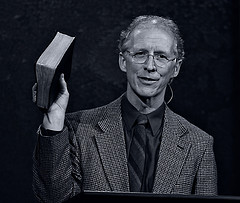 Justin Taylor writes:
Justin Taylor writes:
John Murray’s definition of “common grace” is perhaps the most concise and helpful one available:
every favour of whatever kind or degree, falling short of salvation, which this undeserving and sin-cursed world enjoys at the hand of God (Collected Works, II:96).
Sam Storms has written a very helpful overview of the doctrine, originally written in light of Hurricane Katrina and its damage. He summarizes the biblical evidence under four headings:
1.God exercises restraint on sin and evil.
2.God freely suspends the immediate manifestation of his divine wrath due unto sin.
3.God holds in check the destructive tendencies that are part of the curse of sin upon nature.
4.God bestows upon both nature (see esp. Ps. 65:9-13; 104:10-30; 145:1-16; 136:25) and humanity manifold blessings both physical and spiritual that fall short of redemption itself.
At the end of the essay, he looks at what this means for the end of the world. If you’ve ever been confused about the way in which the Bible seems to talk about things getting worse and worse, while also talking about things getting better, here is an introduction to what Storms thinks is the biblical perspective:
As we approach the second coming of Christ, whether that be one year or one-thousand years in the future, I believe the presence and power of common grace will progressively diminish. The restraining power of the Spirit on the sinful souls of men and women, as well as on the natural creation, will incrementally weaken. The manifestation of human sin and wickedness and unbelief will therefore expand.
Common grace is much like the emergency break on a car that is parked on a steep incline. The weight of the car, together with the force of gravity, would naturally result in its descent down the road and its eventual crash. But the emergency break resists and impedes this otherwise natural inclination. So, too, with human sin. The Holy Spirit is like an emergency break on the human heart. But one day, perhaps imperceptibly and certainly in gradual fashion, the restraint on the sinful and depraved inclination of the human soul will be removed.
But here is the good news. I also believe that together with the progressive withdrawal of common grace will be a corresponding increase of special grace! The people of God will experience fresh and ever-increasing manifestations of divine favor and power and blessing and anointing simultaneously with the withdrawal of the Spirit’s common grace work of curbing the sinful impulses of the lost. This is why there will be an increase of wickedness and persecution (and, yes, martyrdom) in the world at large at the same time there is an increase of righteousness and perseverance in the church in particular.
My “theory” (which I do believe has Scriptural support) is that the Church will experience great revival, ever-increasing impartations of supernatural power, unprecedented expressions of love and unity, all the while she is being oppressed and persecuted and increasingly hated by the unbelieving world. Special grace will intensify even as common grace will diminish.
I should also point out that this process will culminate eternally in what we know as heaven and hell. Heaven is the unabated overflow of special grace. Hell is the utter absence of even common grace. Forever.
So what should be the Christian’s response to Katrina and the devastation she wrought? We should, no pun intended, flood the people who are suffering with expressions of kindness and compassion and generosity, knowing that such devastation could as easily fall on us (cf. Luke 13:1-5). As the Spirit’s provision of common grace diminishes, may the recipients of his special grace overflow in the goodness of Jesus to the glory of God the Father.

 Christian – Do you “thank” God for your conversion? You do because you know that God was entirely responsible for it. You thank God because you do not attribute your repenting and believing to your own wisdom, or sound judgment, or good sense. Or do you?
Christian – Do you “thank” God for your conversion? You do because you know that God was entirely responsible for it. You thank God because you do not attribute your repenting and believing to your own wisdom, or sound judgment, or good sense. Or do you? By John Piper: Website: www.desiringGod.org. Email:
By John Piper: Website: www.desiringGod.org. Email: